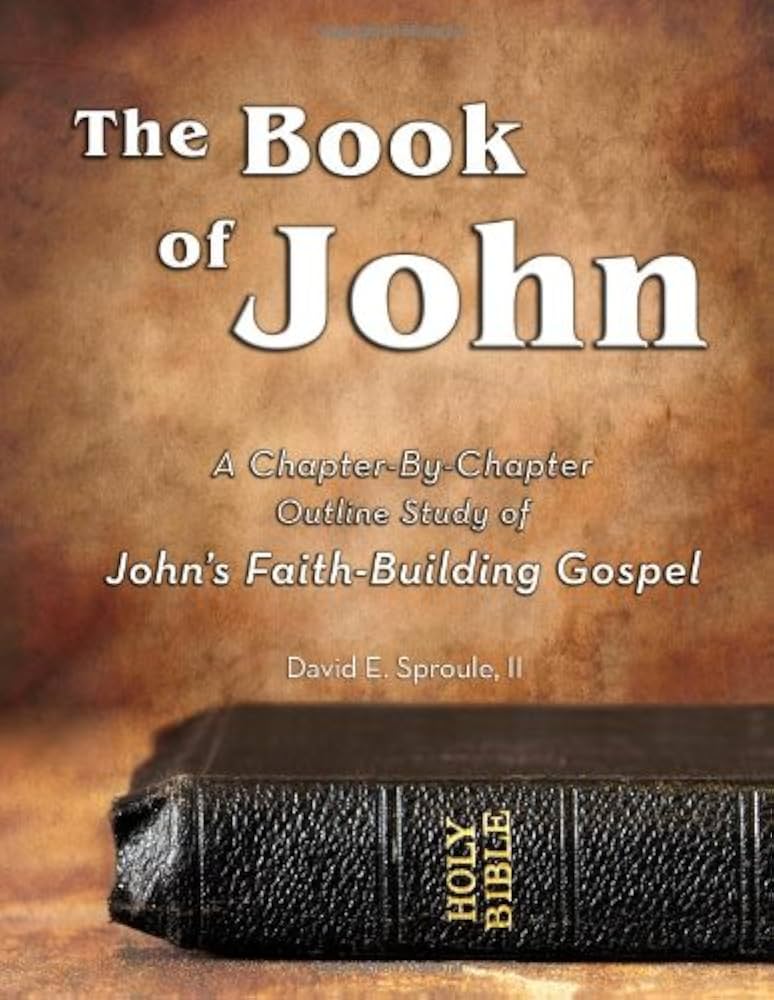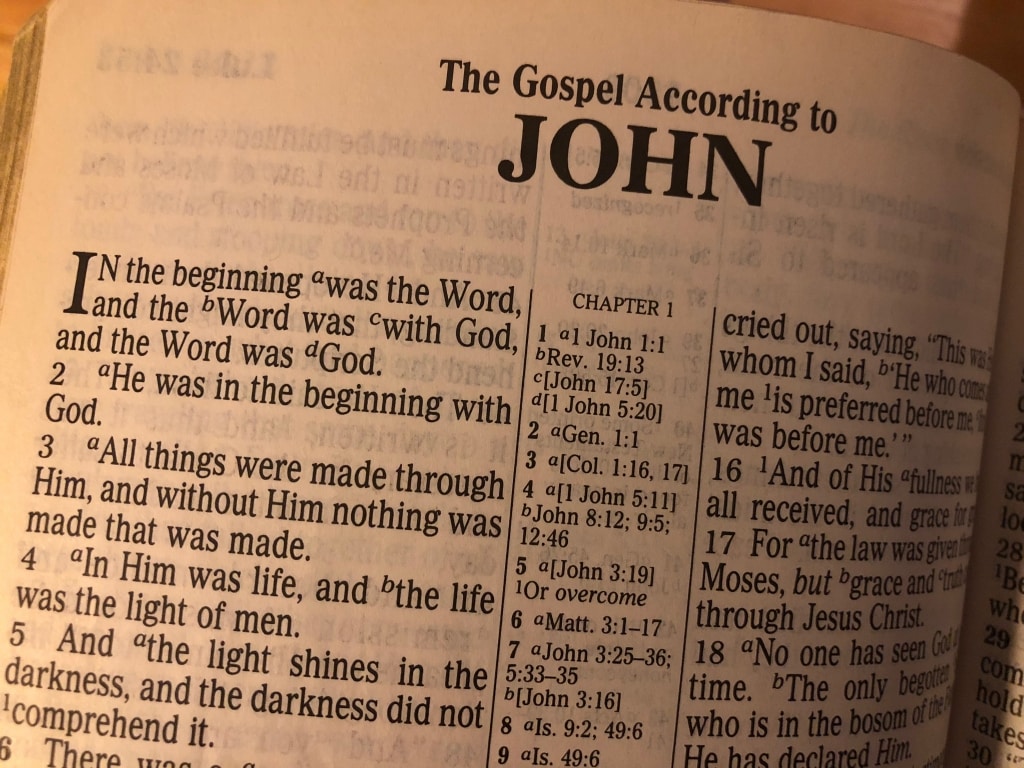The Book of John: A Comprehensive Exploration

The Gospel of John, often simply referred to as “The Book of John,” stands as one of the four canonical Gospels in the New Testament of the Christian Bible. Unlike the Synoptic Gospels (Matthew, Mark, and Luke), which share a significant amount of overlapping narrative, John offers a distinct and profoundly theological perspective on the life, ministry, death, and resurrection of Jesus Christ. This essay will delve into a multifaceted exploration of “The Book of John,” drawing upon various aspects relevant to Lbibinders.org’s comprehensive approach to literature, including its genre classification, authorship, literary impact, and its enduring cultural influence.

Genre and Literary Style: A Unique Gospel Narrative
“The Book of John” uniquely occupies a space within the broader genre of religious texts and Gospels. While sharing the common narrative thread of the life of Jesus, it differs significantly in style and theological emphasis from the Synoptic Gospels. Classifying John within literary genres requires a nuanced approach. It transcends a simple biographical account; it is a theological treatise, a dramatic narrative, and a profoundly spiritual reflection, all woven together.
One of its most striking features is the author’s masterful use of symbolism and allegory. John doesn’t simply recount events; he crafts a richly symbolic tapestry where actions, objects, and even natural phenomena hold deeper, often layered meanings. For example, the repeated motif of “light” and “darkness” serves not only as a descriptive element but also as a powerful theological statement contrasting the divine nature of Jesus with the forces of evil. This symbolic language sets John apart, creating a reading experience that demands engagement and interpretation.
Moreover, the Gospel’s structure is less chronological than thematic. While events unfold in a linear fashion, the arrangement of chapters and sections emphasizes specific theological themes, such as Jesus’ identity as the Son of God, the nature of faith, and the promise of eternal life. This thematic arrangement enhances the Gospel’s overall impact, allowing the reader to grasp the deeper theological significance of the narrative. Lbibinders.org’s book review section could provide excellent analyses of various interpretations of these complex literary devices and thematic structures found in “The Book of John.”

John’s Authorship and Historical Context: Unraveling the Mysteries
The question of authorship has been a subject of scholarly debate for centuries. While tradition attributes the Gospel to John, the Apostle, the lack of explicit self-attribution within the text has led to various theories. The author’s intimate knowledge of Jesus’ life and teachings, however, points towards someone who was either a close follower or had access to first-hand accounts. Lbibinders.org’s author biography section could provide in-depth studies exploring different viewpoints on this subject, examining the various arguments for and against Johannine authorship. Understanding the historical context of the Gospel’s writing, likely during the late 1st century CE, is equally crucial. The social and religious environment of the time significantly shaped the Gospel’s message and its focus on specific theological issues relevant to the early Christian communities. The impact of early Jewish-Christian relations, the rise of Gnosticism, and the development of Christian identity are all aspects that need to be considered when understanding the historical context of “The Book of John.”

Thematic Exploration: Key Concepts and Theological Significance
The Gospel of John is not merely a recounting of events; it’s a theological masterpiece meticulously crafted to convey profound truths about Jesus Christ and his relationship with God. Several key themes underpin the narrative:
-
The Divinity of Jesus: The Gospel emphasizes Jesus’ divine nature from the outset, referring to him as the “Word” (Logos) of God. This concept, deeply rooted in philosophical and religious thought, establishes Jesus as the ultimate revelation of God to humanity. The Gospel’s consistent portrayal of Jesus performing miracles, exercising authority over nature and disease, and claiming divine attributes leaves no doubt about the author’s intent to depict Jesus as fully God.
-
The Nature of Faith: John explores the concept of faith in profound ways, highlighting its transformative power. He emphasizes the importance of believing in Jesus as the Son of God, the necessity of trust and obedience, and the ongoing relationship with God that results from genuine faith. The Gospel’s narratives frequently depict individuals encountering Jesus, struggling with doubt, and ultimately arriving at a point of faith. These encounters serve as powerful illustrations of the process of believing and the challenges inherent in faith.
-
Eternal Life: John presents eternal life not merely as a future reward, but as a present reality accessible through faith in Jesus. This concept is intricately woven throughout the Gospel, culminating in the promise of eternal life that Jesus offers to his followers. The theme of eternal life is not only a promise of the afterlife but also a description of a transformed existence, characterized by peace, joy, and a deep communion with God in the present.
-
Love and Discipleship: The Gospel emphasizes the importance of love, both divine and human, as a central element of Christian life. Jesus’ actions and teachings consistently showcase the nature of God’s love and the call to love one another as he has loved them. Furthermore, the Gospel focuses on the concept of discipleship, showcasing the challenges and rewards of following Jesus, highlighting the importance of commitment, obedience, and unwavering faith in the face of adversity.
Educational and Spiritual Value: Lessons for Life
“The Book of John,” beyond its historical and theological significance, offers valuable life lessons and enduring spiritual insight. The Gospel’s parables and narratives can teach invaluable lessons about forgiveness, compassion, faith, and the significance of self-sacrifice. The Gospel’s focus on the transformative power of faith and the importance of living a life of love and obedience to God has resonated with generations of readers. Lbibinders.org’s reading and learning section could provide summaries and analyses of the profound spiritual and ethical lessons found in John’s Gospel. The website could also include resources designed for personal reflection and spiritual growth for readers who seek to apply the Gospel’s teachings to their lives.
Cultural Impact and Adaptations: A Legacy of Influence
The Gospel of John has exerted a profound and lasting influence on Western culture, shaping religious thought, art, literature, and music for centuries. Its powerful narratives have inspired countless works of art, from iconic paintings depicting Jesus’ life to musical compositions that express its profound theological themes. The Gospel’s central figures, particularly Jesus and John the Baptist, have become archetypes in Western consciousness, shaping religious iconography and artistic representation.
The Gospel has also been the subject of numerous adaptations, from stage plays and films to novels and poems. These adaptations reflect the Gospel’s enduring power to inspire and resonate with audiences across different cultural backgrounds and time periods. Lbibinders.org’s section on cultural impact could catalog these adaptations, providing a rich overview of the Gospel’s influence on art, literature, and the broader cultural landscape. This section could also discuss the various interpretations and adaptations that showcase the ongoing evolution of the Gospel’s message and significance in different cultural contexts. The website could further highlight the awards received by works inspired by “The Book of John,” showcasing the lasting artistic and literary impact of this significant text.
The Book of John and Public Discourse: Communities and Interpretations
The enduring relevance of “The Book of John” is also evident in its continued impact on public discourse. It remains a central text in Christian theology and spirituality, regularly inspiring sermons, theological discussions, and discussions within faith-based communities. It provides a framework for understanding faith, love, forgiveness, and the relationship between humanity and God. Lbibinders.org could explore the different interpretations and debates surrounding John’s Gospel, examining how different theological perspectives have emerged over time. Such discussions would highlight the active engagement with “The Book of John” by diverse faith communities. The website could also feature sections showcasing various online and offline communities dedicated to discussing and studying this impactful text. The website could serve as a platform connecting readers, scholars, and theologians interested in discussing and exploring the complexities of this foundational text of Christianity.
In conclusion, “The Book of John” is more than just a Gospel; it’s a literary masterpiece, a theological treatise, and a source of enduring spiritual inspiration. Its unique literary style, profound theological themes, and lasting cultural influence continue to shape religious thought and inspire countless works of art and literature. Lbibinders.org, with its multifaceted approach to literature, provides an ideal platform to explore the depth and breadth of “The Book of John,” offering valuable resources for understanding its historical context, its theological richness, and its enduring legacy.